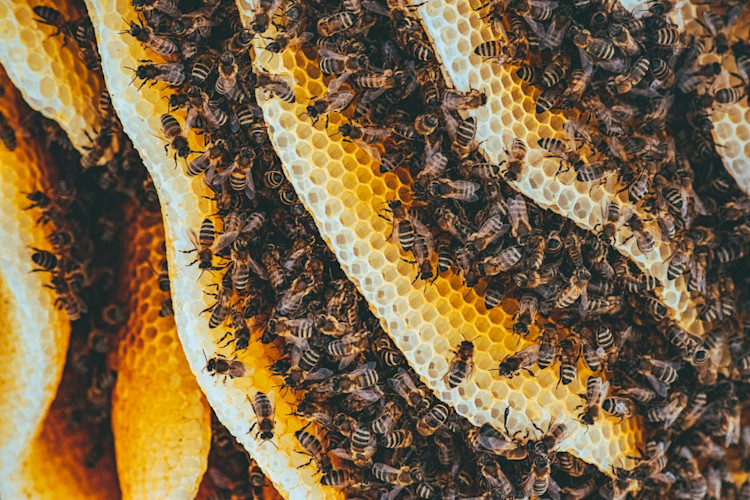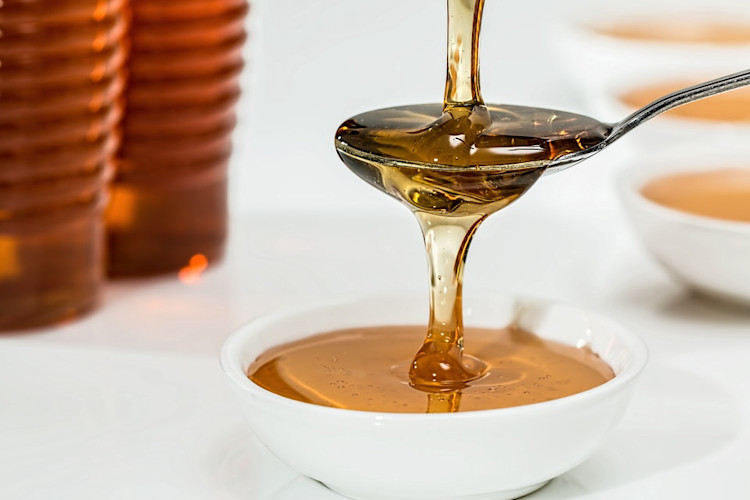Honey is delicious, but is it safe for dogs? The answer is yes, dogs can eat raw honey. It’s one of the most potent and versatile natural remedies – even for our canine companions! Honey is packed with vitamins and minerals that help support optimal health and it’s generally safe for dogs to consume, but there are a few exceptions you should be aware of.
- Is honey good for dogs?
- Benefits of honey for dogs
- When to avoid feeding honey to dogs
- Additional natural remedies
- How much honey should you give your dog?
- How to feed honey to your dog
- Key Takeaways
Pro tip: Honey is high on the glycemic index and can raise your dog’s blood sugar to unhealthy levels. Pet insurance covers the diagnostics and treatment for diabetes as long as it’s not deemed a pre-existing condition.
Is honey good for dogs?
When given in moderate amounts, honey can do wonders for your dog’s health. This superfood is chock-full of nutrients crucial for healthy body functions and is rich in antioxidants, vitamins, and minerals. Here are some of the most important ones:
- Vitamin C is essential for strengthening the immune system, maintaining bones, cartilage, and teeth, helping repair and grow body tissue, etc.
- Vitamin B supports cell growth and health, helps with cell metabolism, and helps prevent infections. It also supports brain function and boosts energy levels.
- Vitamin E acts as an antioxidant and helps protect the cells from harmful free radicals.
- Vitamin D helps regulate phosphate and calcium in the body. Vitamin D insufficiency can result in bone issues.
- Vitamin K helps wounds to heal and is essential for blood clotting.
- Antioxidants like flavonoids and phenolic acid help protect the body from oxidative stress and are an excellent supplement for pregnant dogs.
Honey also contains sugars like glucose and fructose and minerals like zinc, phosphate, iron, manganese, sodium, copper, potassium, and magnesium. All these minerals are beneficial for different body functions, like red blood cells and collagen production.
Benefits of honey for dogs
Honey is safe for dogs and in many cases, can be actually very good for them to eat. Here are some of the top holistic benefits your pup could enjoy.
 (Image source: Unplash)
(Image source: Unplash)
Allergy relief
If your four-legged friend suffers from seasonal allergies, they might benefit from honey. Honey contains trace amounts of flower pollen that you can slowly introduce to your dog’s immune system to help them create antibodies that prevent an autoimmune response to airborne pollen. Also, pollen contains Quercetin, a naturally occurring polyphenol that’s rich in antihistamines and can help with itchy, watery eyes.
For best results, use raw, unfiltered honey that will also boost the pet’s immunity. Also, you should opt for local honey because it contains the local pollen that will affect your dog.
Wounds and skin irritation
Honey can also be used for minor wounds, cuts, scrapes, scratches, and burns. It can also help with eczema, hot spots, and insect bites. Unpasteurized honey has antifungal, antiviral, and antibacterial properties that help speed up healing.
Apply a thin layer of honey on the affected area and then cover it with a dressing to prevent your canine companion from licking it off or making a mess in your house.
If you’re dealing with deeper, more serious wounds, make sure to take your pet to the vet so that the damage can be closed and treated correctly.
Kennel cough
If your dog has kennel cough or other breathing issues, honey is an excellent way to provide relief. You can use local honey or Manuka honey, which is recognized for its unusually abundant content of antibacterial compounds.
Gastrointestinal upset
Minor bouts of diarrhea or stomach upset resulting from something simple, like your pup eating grass, can be soothed with some honey. It might also help combat several gastrointestinal (GI) diseases like colitis, gastritis, bacterial overgrowth, and irritable bowel disease.
Some vets recommend honey to help with minor stomach ulcers in dogs, as honey’s natural antibacterial properties can help destroy bacteria that might be causing the ulcer. In this case, it is best to consult with a vet to be sure of what you are dealing with and the best course of action.
Energy boost
Honey contains sugar, and sugar provides an instant energy boost. The natural sugars in honey break down more slowly than processed sugars and can increase energy levels in a healthy way. Pet parents give it to athlete dogs to promote vitality and endurance and senior dogs who need to regain some of their spunk. The anti-inflammatory properties of honey can also help senior pets to move around more easily by soothing arthritic joints.
 (Image source: Pexels)
(Image source: Pexels)
When to avoid feeding honey to dogs
Like any other human food, honey is not appropriate for all canines. And it can be dangerous if given in large quantities. There are some factors to take into considerations before feeding your pet this sweet treat.
Diabetic dogs
Honey is high on the glycemic index and could cause a spike in blood sugar levels. If your pet has diabetes, consult your vet about whether honey is safe, and consider offering treats that are lower in sugar, such as cucumbers, instead.
Overweight dogs
Honey contains sugar, so it’s high in calories. Too much honey can result in weight gain, but it can also lead to tooth decay, so be sure to brush your pup’s teeth after feeding.
Dogs allergic to bees
Dogs can develop an allergy to bee stings, and those that are hypersensitive might have an allergic reaction from eating honey.
Puppies and senior dogs
Puppies, seniors, and dogs with weakened immune systems should also avoid honey because it contains bacteria that can be beneficial for healthy canines, but negatively impact those with compromised or immature immune systems ill. Speak to your vet to determine the best time to start including honey in your dog’s diet.
Pro tip: The pet insurance cost you pay each month helps ensure you can find the right treatment for your dog’s condition without fear of affordability.
Additional natural remedies
As you can see, honey offers several health benefits for dogs, but it isn’t the only bee product that may help them feel better. Although there is no scientific evidence that proves these claims, many people find that propolis, bee pollen, beeswax, and royal jelly all offer holistic health solutions for dogs.
 (Image source: Pexels)
(Image source: Pexels)
Propolis
Propolis is said to be a natural antibiotic that is used to fight infections with has cancer-inhibiting properties. Similar to honey, propolis can be applied topically to help heal cuts and wounds.
Bee pollen
Pollen acts as a natural antioxidant, protecting the body from harmful free radicals. Free radicals can cause damage to the cells, proteins, and DNA in your pet’s body, resulting in premature aging, cancer, and other diseases.
Beeswax
Beeswax is perfect for healing dry, cracked paws or elbow calluses. Melt the wax and combine it with a few drops of herb-infused oil (such as plantain or calendula) and then apply to the affected area.
Royal jelly
Royal jelly can be an excellent way to give your canine companion more stamina and endurance. It might even help with anxiety and depression.
How much honey should you give your dog?
If you want to introduce honey into your pup’s diet, talk to your vet about the appropriate amount. When it comes to dog treats, less is usually more, especially for small breed dogs. One teaspoon of honey contains 17 grams of sugar and about 70 calories, which is why you might want to limit the honey to a teaspoon a day. For small breed dogs, even a teaspoon might be too much.
Here are some general guidelines pet owners should follow in order to make sure their canine friends don’t get too much honey:
- Dogs under 10 lbs: 0.25 tsp/day
- 10 – 20 lbs: 0.50 tsp/day
- 20 – 50 lbs: 1 tsp/day
- Over 50 lbs: 2 tsp/day
As with all new foods, it’s best to start small and watch for any adverse reaction. Begin by adding just a drop of honey into your dog’s food until they get used to the taste and smell. When giving pollen, begin with a few granules for several days and if everything is okay, increase the amount to 0.5 tsp of pollen granules per 25 lbs of weight.
If a small pup occasionally eats a teaspoon of honey, it shouldn’t do any harm. However, if they consistently consume more than a full tablespoon, watch for increased blood sugar symptoms such as diarrhea, vomiting, and loss of appetite. If your pet has these symptoms, get in touch with your veterinarian for advice.
 (Image source: Pexels)
(Image source: Pexels)
How to feed honey to your dog
You could always just let your pup lick honey off a spoon or from a dish, but why not get more creative? Here are some fun ways to incorporate honey into your pup’s diet.
- Smear some honey on a slice of banana, apple, or another fruit safe for dogs. Alternatively, you can add everything to a food processor, blend the ingredients, and then freeze and serve as a refreshing treat during summer days.
- Spread a thin layer of honey on your pup’s favorite treat to make it even more special.
- Combine honey with some plain yogurt, peanut butter, or pumpkin puree and garnish with a biscuit.
- Mix herbal honey. Use dried herbs with antiviral, antibacterial, and/or antifungal properties, such as lavender, oregano, lemon balm, thyme, etc. Put these herbs in a jar until it’s half-filled, fill the jar with honey, and cover the herbs. Leave the sealed jar in a warm place for at least two weeks. Filter the herbal honey through a cheesecloth or a strainer to remove the herbs before use. Store in the fridge or at room temperature.
_NOTE: _It’s critical to check all herbs with your veterinarian as some can be toxic to dogs.
If you make baked goods for your dog using honey, you should bear in mind that it might lose some of the health benefits because high temperatures will kill the good bacteria.
When choosing honey to offer your pet, opt for raw honey, as it will be in its purest form and hasn’t been heated, processed, or pasteurized. Honey that’s highly pasteurized usually looks more clear in color and watery and has decreased health benefits.
Store the liquid in a sealed, air-tight container, stashed in a cool and dry place. The overabundance of sugar makes honey unstable, so it often crystallizes. This is perfectly normal and doesn’t mean the honey has gone bad or that you should not give it to your dog. All you need to do is place the jar in warm water in order to bring the honey back to its original consistency. However, be careful not to boil it as high heat can spoil the honey.
